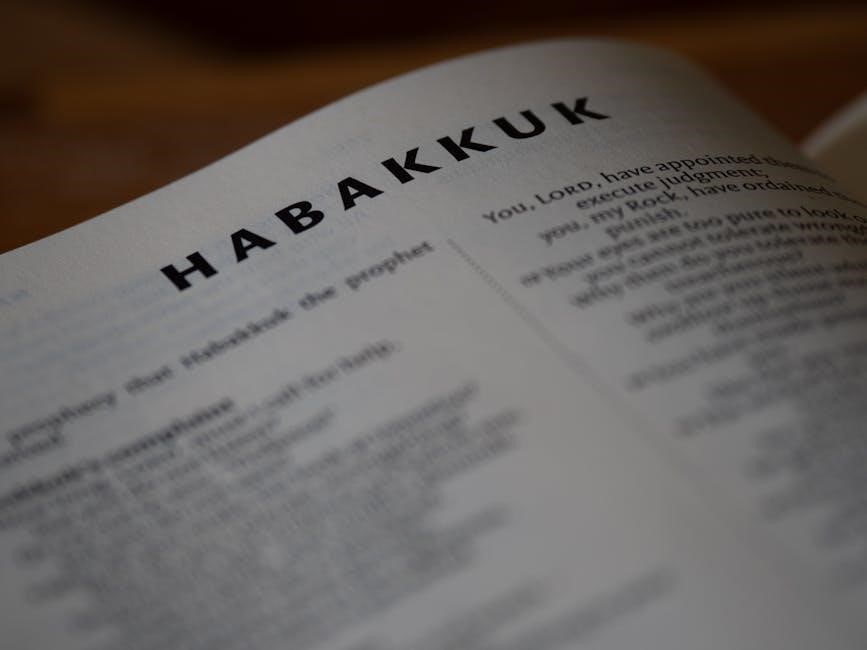
The 12 types of prophets are categorized based on their roles and functions, including Major and Minor Prophets, each with unique divine assignments and spiritual insights.
Overview of Prophets in Religious Contexts
Prophets play a central role in many religious traditions, serving as divine messengers and spiritual guides. In religious contexts, prophets are often categorized into different types based on their roles and functions. For instance, the Bible distinguishes between Major and Minor Prophets, with the former including figures like Isaiah and Jeremiah, whose writings are extensive, and the latter comprising 12 shorter works. Prophets are also classified by their methods of receiving and communicating divine messages, such as through visions, auditory revelations, or inner impressions. Their primary functions include foretelling future events, interpreting divine will, and guiding communities morally and spiritually. Across religions, prophets are revered for their ability to connect humanity with the divine, making them pivotal figures in shaping faith and practice. Their teachings and legacies continue to influence contemporary religious and cultural landscapes.
Significance of Studying Prophetic Types
Studying the 12 types of prophets offers profound insights into their roles, messages, and contributions to religious and cultural contexts. By examining their diverse functions, such as foretelling future events or interpreting divine will, one gains a deeper understanding of their spiritual significance. This study also reveals how prophetic teachings address moral, ethical, and societal issues, providing guidance for both ancient and modern communities. Understanding these prophetic types enriches one’s appreciation of religious texts and their relevance today; Moreover, it highlights the universal themes of hope, redemption, and divine-human interaction, making the study of prophets a valuable pursuit for personal and communal growth. Their legacies continue to inspire and inform contemporary spiritual movements and ethical frameworks.

Major and Minor Prophets in the Bible
The Bible distinguishes between Major Prophets, such as Isaiah, Jeremiah, Ezekiel, and Daniel, and Minor Prophets, comprising 12 shorter books, each offering unique divine insights and teachings.
Major Prophets: Isaiah, Jeremiah, Ezekiel, and Daniel
Isaiah, Jeremiah, Ezekiel, and Daniel are classified as Major Prophets due to the length and depth of their writings. Isaiah is renowned for his messianic prophecies and visions of God’s holiness. Jeremiah, known as the “weeping prophet,” emphasized repentance and divine judgment. Ezekiel’s prophetic ministry included symbolic acts and apocalyptic visions, while Daniel’s prophecies focused on eschatology and divine sovereignty. Their works are foundational to understanding God’s plan for humanity and His relationship with Israel. These prophets addressed both immediate concerns and long-term spiritual truths, providing rich theological insights that remain central to biblical study and interpretation today.
Minor Prophets: The 12 Prophets Overview
The Minor Prophets, comprising 12 books, are Hosea, Joel, Amos, Obadiah, Jonah, Micah, Nahum, Habakkuk, Zephaniah, Haggai, Zechariah, and Malachi. Despite their label, their messages are profound and vital, addressing themes like repentance, justice, and restoration. Hosea emphasized divine love and faithfulness, while Amos championed social justice. Jonah’s story highlights God’s mercy beyond Israel. These prophets collectively call for spiritual renewal and fidelity to God, offering insights into His character and plans. Their teachings remain relevant, providing guidance for moral living and theological understanding, underscoring the timeless relevance of their messages in both ancient and contemporary contexts.

Types of Prophets Based on Function
Prophets are categorized into two main functional types: Nabi prophets, who receive revelations through hearing God’s voice, and Seer prophets, who receive through visions and insights.
Forthtellers: Predicting Future Events
Forthtellers are prophets who primarily focus on predicting future events. They receive divine revelations about upcoming occurrences, often serving as warnings or promises to guide humanity. Moses and Isaiah are notable examples, as their prophecies shaped the course of history. These prophets emphasize the importance of divine sovereignty and human responsibility, urging people to align their actions with God’s will. Their predictions often carry a call to repentance, highlighting the consequences of disobedience. By foreseeing events, forthtellers provide insight into God’s plan, offering hope and direction to their audiences. Their role is both informative and transformative, bridging the present with the future.
Foretellers: Interpreting Divine Will
Foretellers are prophets who specialize in interpreting divine will, focusing on understanding and explaining God’s intentions. Unlike forthtellers, their role is not primarily predictive but interpretive, offering clarity on spiritual truths and moral guidance. They often serve as teachers, helping communities grasp the deeper meanings of religious teachings. Their insights are crucial for navigating complex ethical dilemmas and aligning communal actions with divine purposes. By unpacking God’s will, foretellers empower individuals and groups to live according to sacred principles. Their interpretations provide a moral compass, fostering spiritual growth and unity among believers. This prophetic type emphasizes wisdom, discernment, and the application of divine truths in everyday life.
Prophetic Roles and Responsibilities
Prophets serve as spiritual leaders, guiding communities morally and ensuring divine will is understood and followed, while addressing societal issues and fostering righteousness.
Spiritual Leadership and Guidance
Prophets play a pivotal role in providing spiritual leadership, guiding communities to align with divine will and moral principles. They often serve as intermediaries between the divine and humanity, offering teachings that foster righteousness and spiritual growth. Through their revelations and interpretations, prophets help people navigate complex moral and ethical dilemmas, ensuring the community remains faithful to its spiritual foundations. Their leadership extends to addressing societal issues, promoting justice, and encouraging personal and collective transformation. This role is evident across various prophetic traditions, where their guidance has shaped the spiritual and cultural fabric of their communities, leaving a lasting legacy of wisdom and inspiration.
Moral and Ethical Teaching
Prophets are instrumental in imparting moral and ethical teachings, emphasizing justice, compassion, and righteousness. They often critique societal injustices and call for adherence to divine laws, advocating for the vulnerable and marginalized. Their teachings transcend cultural boundaries, promoting universal principles of honesty, integrity, and love. By addressing ethical dilemmas and moral decay, prophets guide individuals and communities toward a path of virtue and accountability. Their ethical frameworks continue to inspire modern societies, offering timeless wisdom for personal and collective transformation. This role underscores the enduring relevance of prophetic teachings in fostering a morally upright and just world.

Historical Development of Prophetic Movements
Prophetic movements emerged in ancient contexts, evolving over centuries to address spiritual, social, and political challenges, shaping religious and cultural landscapes through divine inspiration and moral guidance.
Early Prophetic Movements in Ancient Contexts
Early prophetic movements emerged in ancient Near Eastern societies, particularly in Israel, where prophets served as divine messengers. These movements were deeply rooted in religious and cultural traditions, with figures like Moses and Samuel playing pivotal roles. Prophets often arose during times of crisis, addressing moral decay and calling for repentance. Their messages were frequently tied to covenant obligations, emphasizing faithfulness to God. The earliest prophets, such as Elijah and Elisha, were charismatic leaders who combined spiritual guidance with social activism. Over time, these movements evolved, transitioning from informal, individualistic prophetic activity to more organized forms. This period laid the foundation for the structured prophetic roles seen in later biblical history.
Evolution of Prophetic Roles Over Time
The roles of prophets evolved significantly over time, adapting to the changing needs of their communities. Early prophets often served as charismatic leaders, addressing immediate crises and delivering divine messages orally. As societies grew more complex, prophetic roles became more structured, with prophets taking on both spiritual and social responsibilities. The transition from oral prophecy to written records marked a significant shift, as seen in the works of Major Prophets like Isaiah and Jeremiah. Post-exilic periods saw the rise of institutionalized prophecy, blending tradition with new revelations. This evolution reflected the dynamic interplay between divine inspiration and human context, ensuring prophetic messages remained relevant across generations.

Cultural and Social Influences on Prophets
Cultural and social contexts profoundly shaped prophetic roles, with messages often reflecting the socio-political climates and communal needs of their time, influencing their divine inspirations.
Socio-Cultural Contexts Shaping Prophetic Messages
Socio-cultural contexts significantly influenced the messages of prophets, as they often addressed specific issues within their societies. For instance, prophets like Isaiah and Jeremiah spoke to the political and moral crises of their time, calling for justice and repentance. The cultural environment, including traditions and beliefs, shaped the language and imagery used in their prophecies. Additionally, social structures, such as the divide between the rich and the poor, were frequently highlighted in their teachings. Prophets also drew from their cultural heritage to convey divine truths, making their messages both relevant and impactful to their audiences. This interplay between culture and prophecy ensured that their words remained meaningful and transformative.
Impact of Prophets on Their Communities
Prophets profoundly impacted their communities by addressing moral, social, and spiritual issues. They called for justice, condemned oppression, and urged repentance, fostering societal transformation. Their teachings united communities in times of crisis and provided hope for the future. Many prophets also challenged existing power structures, advocating for the marginalized. Their influence extended beyond their lifetimes, shaping cultural and religious norms. The prophets’ messages continue to inspire and guide communities today, emphasizing ethical living and divine accountability. Their legacies remain central to religious traditions, offering timeless wisdom and guidance for addressing modern challenges.

Prophets and Their Visions
Prophets received divine revelations, often through visions, to guide communities and foresee future events, interpreting God’s will and providing spiritual direction for His people.
Receiving Revelations and Visions
Prophets received divine revelations through various means, including auditory messages, inner impressions, or vivid visions. These experiences often served as the foundation for their prophetic messages. Nabi prophets typically heard God’s voice directly, while Seer prophets relied on visionary experiences to discern divine truths. The process of receiving revelations was deeply spiritual, requiring a heightened sensitivity to God’s presence. Many prophets, such as Isaiah and Ezekiel, described their encounters in detail, emphasizing the clarity and authority of their call. These revelations were not only personal but also communal, guiding communities toward repentance and alignment with God’s will. The act of receiving visions underscored the prophet’s role as a bridge between the divine and human realms.
Interpreting and Communicating Visions
Prophets played a crucial role in interpreting and communicating divine visions to their audiences. Their ability to decode spiritual messages ensured clarity and relevance for the people. Many prophets, like Ezekiel, used symbolic language and metaphors to convey complex truths, making the divine message accessible to all. Effective communication often involved both verbal and non-verbal methods, such as symbolic actions or parables, to emphasize the urgency of their revelations. The prophet’s task was not only to receive visions but also to articulate them in a way that resonated with the cultural and social contexts of their time. This interpretative skill was essential for guiding communities toward spiritual understanding and collective action, fulfilling their role as messengers of God’s will.

Gender Roles Among Prophets
Both male and female prophets played significant roles, with women like Deborah and Huldah contributing alongside prominent male figures, showcasing diverse divine appointments and spiritual leadership.
Male Prophets and Their Roles
Male prophets, such as Isaiah, Jeremiah, and Ezekiel, were prominent in delivering divine messages, often addressing national crises and moral decay. They served as spiritual leaders, guiding communities through turbulent times and calling for repentance. Their roles encompassed forecasting future events, interpreting divine will, and upholding ethical standards. These prophets were instrumental in shaping religious and cultural norms, emphasizing justice and righteousness. Their writings and teachings remain foundational in religious texts, offering timeless wisdom and guidance. The influence of male prophets extended beyond their lifetimes, leaving a lasting impact on their communities and subsequent generations. Their contributions highlight the significance of prophetic leadership in shaping human history.
Female Prophets and Their Contributions
Female prophets, though less prominent in historical records, played significant roles in religious and cultural contexts. Figures like Deborah, Huldah, and Miriam served as divinely appointed leaders, offering guidance and wisdom. They often functioned as judges, teachers, and intermediaries, addressing both spiritual and communal needs. Their contributions emphasized justice, compassion, and faith, influencing their societies deeply.
Despite facing societal constraints, female prophets demonstrated remarkable courage and spiritual authority. Their ministries often included teaching, prophesying, and guiding communities through crises. While their roles were sometimes overshadowed by male counterparts, their impact remains profound, highlighting the diverse ways divine messages were conveyed. Their stories underscore the importance of inclusivity in prophetic traditions, showing that divine calling transcends gender.

Modern Relevance of Prophetic Teachings
Prophetic teachings remain vital today, offering timeless wisdom on justice, compassion, and integrity. They inspire personal and societal transformation, guiding humanity through modern challenges.
Applying Prophetic Wisdom Today
Prophetic wisdom offers timeless guidance for modern life, emphasizing justice, compassion, and integrity. By applying these teachings, individuals can navigate moral dilemmas, foster unity, and promote ethical leadership. Prophetic insights encourage personal reflection, societal reform, and spiritual growth. They provide a framework for addressing global challenges, such as inequality and environmental sustainability. Many contemporary movements draw on prophetic principles to inspire positive change and advocate for human rights. The universal messages of prophets transcend time, making their teachings invaluable for addressing today’s complex issues. Their wisdom continues to empower individuals and communities to strive for a more just and compassionate world.
Contemporary Prophetic Movements
Modern prophetic movements emphasize spiritual renewal and social transformation, drawing from ancient wisdom while addressing contemporary issues. These movements often blend traditional teachings with innovative approaches, fostering a sense of community and purpose. They focus on empowering individuals to become agents of change, promoting justice, and advocating for human rights. Contemporary prophets frequently use technology and media to spread their messages, reaching global audiences. These movements also encourage interfaith dialogue and collaboration, aiming to unite people across diverse backgrounds. By integrating prophetic principles into daily life, they inspire individuals to pursue ethical living and contribute to a more compassionate society. Their influence extends beyond religion, impacting cultural and political landscapes.
The study of the 12 types of prophets reveals their profound impact on religious, cultural, and historical landscapes, emphasizing their enduring relevance in guiding humanity toward spiritual and moral awakening.
The 12 types of prophets are categorized into Major and Minor Prophets, each with distinct roles. Major Prophets like Isaiah and Ezekiel delivered extensive revelations, while Minor Prophets such as Hosea and Amos focused on specific messages. Functionally, prophets are classified as Forthtellers, predicting future events, and Foretellers, interpreting divine will. Additionally, Nabi prophets received revelations through hearing God’s voice, whereas Seer prophets relied on visions. These categories highlight the diversity of prophetic ministries, emphasizing their unique contributions to spiritual guidance, moral teaching, and societal transformation. Their messages remain timeless, offering wisdom for modern applications and underscoring the significance of prophetic leadership across generations.
Final Thoughts on the Significance of Prophets
Prophets hold profound significance as spiritual leaders and visionaries, guiding humanity through divine revelations and moral teachings. Their messages, whether predictive or interpretive, have shaped cultures and communities across centuries. The 12 types of prophets, categorized by their roles and functions, underscore the diversity of their ministries. From Major Prophets like Isaiah to Minor Prophets like Amos, their contributions remain timeless. Their teachings emphasize justice, compassion, and faith, offering guidance for modern spirituality. The enduring impact of prophets lies in their ability to inspire transformation and provide hope, ensuring their relevance in both historical and contemporary contexts. Their legacy continues to illuminate the path for seekers of truth and wisdom.




